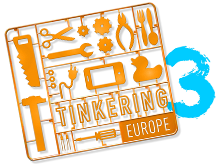
This project continues the work of Tinkering EU: Contemporary Education for Innovators of Tomorrow that introduced Tinkering methodology in Europe. It also builds upon the work of Tinkering EU: Building Science Capital for ALL that explored Tinkering and Science Capital with a specific focus on teachers and students from disadvantaged communities. Tinkering EU: Addressing the Adults focusses on fostering the socio-educational and personal development of adults.
Tinkering, inspired by the USA-based experience of the Exploratorium of San Francisco, is proven to be a powerful tool that contributes to the improvement of key competences and skills, and connects science knowledge and skills with the requirements of the contemporary labour market.
The first project (09/2014-08/2017) implemented the innovative pedagogy of Tinkering at European level, through activities and resources primarily addressed to adult learners and educators in formal and informal education institutions.
The second project (09/2017-08/2020) integrated Tinkering activities and methods into the school context. It has responded to the contemporary society’s needs through activities and resources that support a learner-centred culture, improve science education and develop 21st century skills – all of which are fundamental for active citizenship, employability, social inclusion.
This project aims to foster the socio-educational and personal development of adults, as well as their participation in civic and social life, focusing on the following priorities:
In this project we will partner with community sector leaders already working with the project’s target adult groups. Working with these community partners, we aim to both learn from and support existing community sector practice, encouraging exchange of knowledge and expertise between the community development and informal learning sectors. We aim to work with community partners to co- develop adult learning opportunities using Tinkering methodology, that will target adults from underserved and vulnerable groups such as refugees, asylum-seekers, people with a low-incomes, mental health users, offenders in prison, unemployed adults and young adults not in formal education. We aim to develop and deliver high-quality learning opportunities tailored to the needs of vulnerable and/or underserved adults with an emphasis on creating more equitable experiences of science participation that can help inform the wider sector in relation to widening participation, access and inclusion. Tinkering methodology will be used as a catalyst for encouraging science participation, developing skills and increasing intercultural dialogue. Our project will bring together people with different backgrounds to experience STEM in ways that are personally meaningful to them and to help them experience STEM in ways that are relevant to their lives.
Tinkering EU addresses adults who are not familiar with Science and Technology and have a low science capital, associate community partners who work with the target groups, as well as museum professionals, through the following activities and resources.